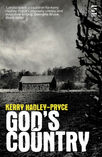Black Country Farms
- Kerry Hadley
- Mar 1, 2018
- 2 min read
https://www.expressandstar.com/news/crime/2016/05/10/stolen-sheep-rescued-as-ewe-sual-suspect-found-hiding-up-a-tree/
and
https://www.birminghammail.co.uk/news/midlands-news/sheep-rustlers-strike-black-country-6498406
I've been thinking about the setting of this novel. A farm. In the Black Country. They do exist - or they certainly used to. And there still is land known as 'urban farmland' around this place. The article, from 2016, about sheep being stolen from a farm, made me think about the inclusion of that into the novel, and wondering if the placement of a farm works. But I've been re-reading Lane's From Blue to Black and my own notes on it:
+ Defamiliarising a place to reveal its wonder is what I've written.
+ a blurring of reality and fiction.
+ Does Lane have a more subjective, personal relationship with the Black Country?
+ The psychogeographic quality of connecting space and time, of imbuing the present with the importance of the past is explored and abused with Karl's lie.
+ David becomes part of the lie and therefore, as much a part of the landscape, as Karl does.
+ There is a sense that the Black Country, and, more particularly, the canal in Stourbridge is a psychogeographic space, existing in, and connected to, a combined history between the two men.
+ Karl's reconstruction gives the place meaning.
+ It appears, with this recount, to be a moral tale, inserted, that this place is what has made Karl who he is - that the geography has created his psyche.
+ The importance of walking here, by the canal or next to the river is deepened, because you can only walk down there.
+ The importance of the walker's-eye-view.
And I think it's OK to set this on a farm, in the Black Country. and I think I need to keep in mind my notes (above) for the next part of this novel.









Comments